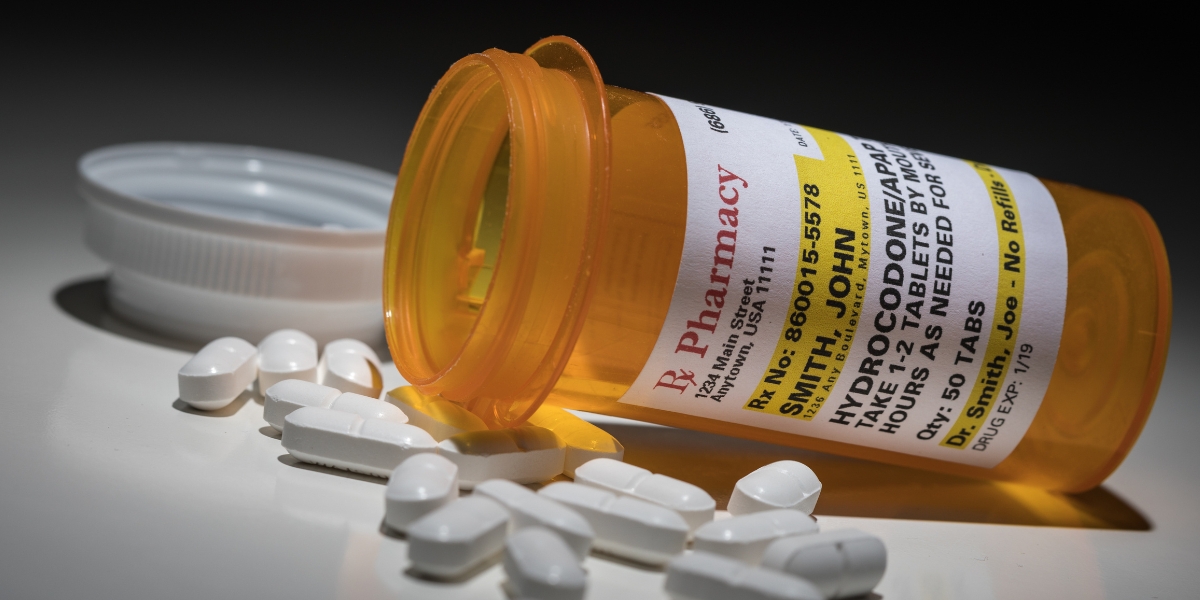Vicodin Addiction, Effects, and Withdrawal

Vicodin, a combination of hydrocodone and acetaminophen, is one of the most widely used and abused medications, with approximately 83.6 million people filling prescriptions each year in the United States.
Many people believe that because Vicodin is less potent than morphine, oxycodone, and other opioid-based pain relievers, it is less dangerous and not as addictive. Unfortunately, that is untrue, as Vicodin has the same harmful side effects and risk factors for abuse and addiction.
The United States is the largest consumer of prescription pain relievers in the world. Many people use them responsibly, but millions become addicted and develop substance use disorders that require professional treatment. America is experiencing a prescription drug abuse epidemic contributing to the growing opioid crisis.
What Is Vicodin?
Vicodin is the name-brand opioid-based pain reliever that combines hydrocodone and acetaminophen to treat moderate to severe pain. It is a central nervous system depressant that works throughout the brain and body to reduce pain signals and cause feelings of relaxation.
In the United States, Vicodin is a schedule II controlled substance with limited medical use and the potential for moderate to high physical and psychological dependence and abuse. Vicodin is more potent than codeine but less powerful than morphine. It comes in tablet, capsule, extended-release capsule, or syrup form in concentrations of 2.5, 5.0, 7.5 and 10 milligrams.
Most Vicodin on the illegal drug market is given, sold to, or taken by people other than prescription holders; it is rarely counterfeited or produced illegally.
What Does Vicodin Do?
The addictive qualities of Vicodin come from hydrocodone, an opioid painkiller and central nervous system depressant. Acetaminophen is a fever reducer that lessens muscle aches and is in many over-the-counter medicines.
Vicodin binds to receptors throughout the body to lower the impact of pain signals and gives an overall feeling of calm and relaxation; when people abuse the prescription drug by taking higher doses or mixing it with alcohol or other drugs, these feelings increase.

Understanding Vicodin Addiction
Vicodin is an opioid that causes dependence quickly, even if you follow directions. Dependency does not always mean you will develop an addiction, but it increases the likelihood.
The longer you take it, the more you develop a tolerance, which requires larger and more frequent doses to feel the desired effects. An increase in tolerance means that the body is dependent on Vicodin to function, and many people are psychologically addicted to Vicodin as well.
Recreational users often mix it with other central nervous system depressants to heighten the effects. Mixing multiple substances can develop co-occurring mental heal disorders, complicated withdrawal, and overdose.
Risk factors for Vicodin addiction include:
- A family history of addiction
- A personal history of substance abuse
- Existing mental health disorders
- Chronic pain conditions
- Easy access to Vicodin
Prescription opioid addiction frequently requires professional help from a rehab center with evidence-based treatment programs to get through withdrawal safely and treat any co-occurring disorders and contributing factors to addiction.
Signs and Symptoms of Vicodin Addiction
It can be challenging to notice the signs and symptoms of Vicodin addiction in someone, especially if they have a valid medical reason for using; however, behavioral, physical, and mental changes become apparent as the addiction progresses.
Common behavioral signs of Vicodin addiction include:
- Running out of their prescription early
- Visiting multiple doctors to get prescriptions
- Asking friends and family members for their medications
- Stealing from friends and family
- Neglecting responsibilities and personal hygiene
- Withdrawing from social circles and relationships
- Job difficulties
- Taking risks or making poor choices to get more of the medication
- An inability to stop using
Common physical symptoms of Vicodin addiction include:
- Drowsiness
- Pinpoint or dilated pupils
- Insomnia
- Repetitive fidgeting or pacing
- Slow reflexes or movements
- Constipation
- Experiencing withdrawal symptoms when they take the opioid
Common mental and psychological signs of Vicodin addiction include:
- Mood swings
- Intense cravings for the prescription drug
- A preoccupation with getting and using
- Memory loss
- Depression
- Loss of interest in things they previously enjoyed
- Difficulty focusing
- Poor reasoning and judgment
- Suicidal thoughts
Addiction signs and symptoms can develop over time, making it hard for people close to the addict to realize how drastically they have changed.
Long-Term Effects of Vicodin Abuse
Vicodin can produce immediate adverse effects like nausea, vomiting, dizziness, and diarrhea. However, chronic and repeated use can cause long-term effects requiring treatment and medical attention.
Long-term effects of Vicodin abuse include:
- Chronically dry nose and mouth
- Oxygen deprivation in tissue throughout the body
- Vision loss
- Digestion problems
- Abdominal cramping
- New or worsening mental health symptoms
- Weightloss
- Malnutrition
- Frequent urinary tract infections
- Liver damage
- Kidney damage
- Respiratory depression
- Sexual dysfunction
- Suicidal thoughts
Because it contains a considerable amount of acetaminophen, combining it with other medications or alcohol can dramatically increase the risk of severe liver damage and failure.

Vicodin Withdrawal Symptoms
People who abruptly stop taking Vicodin experience withdrawal symptoms ranging from uncomfortable to life-threatening. The length and severity of the Vicodin withdrawal effects vary based on how long the opioid abuse has been going on, biological factors, co-occurring disorders, and other addictions that also cause withdrawal.
Symptoms of Vicodin withdrawal include:
- Muscle aches and pain
- Watery eyes
- Fever
- Nausea
- Vomiting
- Diarrhea
- Abdominal cramps
- Sweating
- Changes in body temperature
- Sleep pattern changes
- Intense drug cravings
- Anxiety
- Depression
- Agitation
- Suicidal thoughts
You should always seek medical advice before quitting any medication. Many people require a medical detox process to ensure their health and safety.
Vicodin Addiction Treatment
If you or a loved one is struggling with a prescription opioid addiction, Northridge Addiction Treatment Center allows you to achieve meaningful, life-long recovery.
Our residential treatment facility offers onsite medical detox to keep you safe through withdrawal, with 24-hour medical care and support. After completing detox, our compassionate treatment specialists work closely with you to ensure your treatment plan is tailored to your individual needs and concerns, using evidence-based treatment programs.
Reach out to one of our treatment specialists and take the first step toward reclaiming your life.
Find Meaningful Recovery
Our caring and compassionate specialists are eager to help you comfortably navigate this journey to recovery. Our individualized treatment plan, programs, and therapies may be a perfect match for you or your loved one. Let us assist you in living the happy life you deserve. It starts with a phone call.




